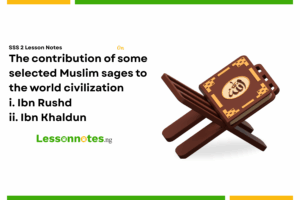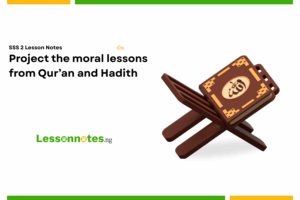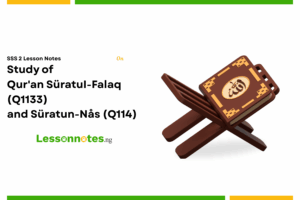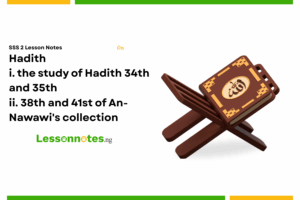Islamic Moral Education II – Understanding Brotherhood in Islam SS3 Islamic Studies Lesson Note
Download Lesson NoteTopic: Islamic Moral Education II – Understanding Brotherhood in Islam
Understanding the Brotherhood in Islam
Brotherhood in Islam, often referred to as “Ukhuwah,” is a concept deeply ingrained in the faith’s core principles. It signifies a bond of solidarity and mutual support among Muslims. The Quran and Hadiths emphasize the importance of fostering this unique connection among believers.
Quranic Verses on Brotherhood:
Surah Al-Hujurat (49:10): “The believers are but brothers, so make settlement between your brothers. And fear Allah that you may receive mercy.”
This verse underscores the unity of believers, emphasising the need to resolve conflicts amicably and maintain the spirit of brotherhood.
Surah Al-Tauba (9:71): “The believing men and believing women are allies of one another. They enjoy what is right and forbid what is wrong.”
This verse emphasises the partnership and mutual support that should exist among Muslims.
Hadiths on Brotherhood:
The Hadiths further reinforce the concept of brotherhood in Islam. Prophet Muhammad (peace be upon him) stated:
- “A Muslim is a brother of another Muslim. He does not oppress him, nor does he leave him at the mercy of others.” (Sahih al-Bukhari)
- “The believers in their mutual kindness, compassion, and sympathy are just like one body. When one of the limbs suffers, the whole body responds to it with wakefulness and fever.” (Sahih al-Bukhari)
These Hadiths exemplify the profound sense of empathy and support that Muslims are encouraged to offer one another.
The Importance of Brotherhood in Daily Life
Brotherhood in Islam extends beyond mere words; it is a living, breathing concept that shapes the lives of Muslims. It influences their behaviour, interactions, and responsibilities towards one another.
- Support and Solidarity: Muslims are taught to stand by their fellow believers in times of need. Whether it’s financial assistance, emotional support, or simply offering a helping hand, brotherhood strengthens the community.
- Conflict Resolution: Resolving conflicts amicably is a key aspect of brotherhood. Islam encourages open communication and peaceful solutions, preventing discord within the community.
- Sharing in Joy and Sorrow: Muslims celebrate each other’s successes and share in their sorrows. This unity of emotion brings believers closer together, fostering a sense of belonging.
- Collective Worship: Congregational prayers and acts of worship at the mosque are a manifestation of brotherhood in action. Praying together strengthens the bond among Muslims.
Religious Tolerance and Peaceful Co-Existence in Islam
In the early sources of the holy books, including the Qur’an, mankind is seen as God’s most beloved creatures – those who maintain order on earth. According to Islam, God is seen as the common Creator of all people, as well as the single source of prophets and holy books.
It is precisely for this reason that believers of Islam are called to believe in all of God’s prophets who are mentioned in their holy book, the Qur’an, as well as in other prophets mentioned in earlier holy books, including the Old and the New Testaments. According to Islamic teachings, denying any one of these prophets is considered a deviation from the general Qur’anic message.
Religion could serve as a broad, uniting platform through which people of different religions can come together in their respect for different ideas and beliefs, as well as for joint action in the service of human society.
The various religious beliefs associated with God Almighty should not prevent us from cultivating a peaceful life on earth.
The absolute judgement of a man’s righteousness of faith or lack of faith belongs to his Creator. Because, if God had willed it, all the people in the world would have belonged to a single religious community. The Qur’an stipulates that there was more than one messenger and more than one book revealed by God. The Qur’anic call to believe in all prophets as God’s chosen ones, distinguished to convey heavenly messages on earth, is explicitly mentioned in the Qur’an: “The Messenger (Muhammad) believed in what was revealed to him from his Lord, and so did the believers.
Everyone believed in Allah, His angels, His revelations, His messengers. We make no distinction between any of His messengers, and they said: We answered the call and obeyed the command. We ask for your forgiveness, our Lord! Only in You is our future. (Al-Baqarah: 285). This Qur’anic quotation clearly shows that the human world has had prophetic missions from the beginning and that all the prophets were inspired by a single God but people divided themselves according to how they accepted and perceived His message.
The correct line of interpreting Islam always calls for the good and proper treatment of all who do not share the same belief in God. In this regard, his teachings require respect, tolerance, and decent human behaviour as virtues that build a meaningful life and peace between people. Man cannot and must not be driven by force or violence to believe in a certain faith, but neither can he be hated nor fought against for the fact that he or she does not share the same path of belief in God as us. “There is no violence in religion.” (al-Baqar: 257)
Enjoining The Good And Forbidding The Evil
{وَلْتَكُن مِّنكُمْ أُمَّةٌ يَدْعُونَ إِلَى ٱلْخَيْرِ وَيَأْمُرُونَ بِالْمَعْرُوفِ
وَيَنْهَوْنَ عَنِ ٱلْمُنكَرِ وَأُولَٰٓئِكَ هُمُ ٱلْمُفْلِحُونَ}
And there may spring from you a nation who invites goodness, and enjoins right conduct and forbid indecency. Such are they who are successful. (Al Imran 3:104).
Enjoining right conduct means advice to do good forbid indecency and arrest or detain the doing of evil. The accomplishment of these two orders is not limited to a specific age group, and thus Luqman (pbuh) says to his son”
{يَا بُنَيَّ أَقِمِ الصَّلَاةَ وَأْمُرْ بِالْمَعْرُوفِ وَانْهَ عَنِ الْمُنكَرِ}
O, my dear son! Establish worship and enjoin kindness and forbid iniquity… (Luqman 31:17).
Enjoining good is a sign of love for the faith, love for the people, a desire for the wellbeing of society and a sign of freedom of expression, religious zeal, a friendly association with other people, a sign of an awakened instinct, general control and presence in the society.
Enjoining the good and forbidding the evil is the reason for encouraging those who do good, making aware those who are ignorant, being aware of the prevention of offences and the formation of a form of societal control. The Holy Qur’an states
{كُنتُمْ خَيْرَ أُمَّةٍ أُخْرِجَتْ لِلنَّاسِ تَأْمُرُونَ بِالْمَعْرُوفِ وَتَنْهَوْنَ عَنِ الْمُنكَرِ}
You are the best nation ever brought forth to men, bidding to honour, and forbidding dishonour (Al Imran 3:110).
Imam Ali (pbuh) states that enjoining the good and forbidding the evil is in the interest of the public.1 Likewise in another narration, we read anyone who does not stand against evil is like someone who leaves an injured on the road until they pass away.
Prophets like David and Jesus peace upon them would curse those who do not stand against evil.
{لُعِنَ الَّذِينَ كَفَرُوا مِن بَنِي إِسْرَائِيلَ عَلَىٰ لِسَانِ دَاوُودَ وَعِيسَى ابْنِ مَرْيَمَ}
Cursed were the unbelievers of the Children of Israel by the tongue of David, and Jesus, Mary’s son (Maida 5:78).
The revolution of Imam Hussein (pbuh) was for the enjoining the good and forbidding the evil, “I want to enjoin good and forbid evil”.3
Silence and indifference in the face of sin are the reason for the normalisation of sinning, those who sin find courage, we become heavy-hearted, Satan finds contentment and Allahﷻ will be displeased with us.
The Holy Qur’an states that if you find yourself in the company of those who insult the Holy Qur’an, leave the company in protest until such time the conversation changes.
If one invites another to do good deeds, a partnership in reward is forged, but if in the face of corruption, deviation and sin we sit silently, step by step the corruption grows and corrupt and seditious individuals will end up governing society. One must at the onset of sin, not only show displeasure with the tongue and forbid the evil but also utilise all available legal avenues and abilities to end the continuation of evil.
Enjoining the good and forbidding the evil are two divinely ordained laws, and the imagination that the sin that others do has nothing to do with me, and we should not take away the freedom of others, I am a shy and scared person, one change won’t make any difference anyway, Jesus has his religion and Moses has his religion, we won’t be buried in the same grave, there are others, why should I be the one forbidding evil?, by forbidding evil friends and customers will walk away, and other examples like these, are not able to lift this responsibility from our shoulders.





















